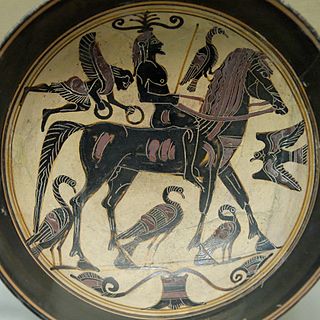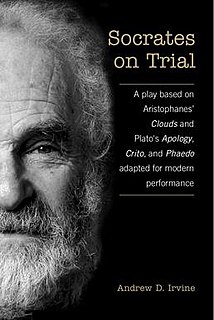
Aristophanes, son of Philippus, of the deme Kydathenaion, was a comic playwright or comedy-writer of ancient Athens and a poet of Old Attic Comedy. Eleven of his forty plays survive virtually complete. These provide the most valuable examples of a genre of comic drama known as Old Comedy and are used to define it, along with fragments from dozens of lost plays by Aristophanes and his contemporaries.
The trial of Socrates was held to determine the philosopher's guilt of two charges: asebeia (impiety) against the pantheon of Athens, and corruption of the youth of the city-state; the accusers cited two impious acts by Socrates: "failing to acknowledge the gods that the city acknowledges" and "introducing new deities".
This article concerns the period 429 BC – 420 BC.
This decade witnessed the continuing decline of the Achaemenid Empire, fierce warfare amongst the Greek city-states during the Peloponnesian War, the ongoing Warring States period in Zhou dynasty China, and the closing years of the Olmec civilization in modern-day Mexico.

Alcibiades was a prominent Athenian statesman, orator, and general. He was the last of the Alcmaeonidae, which fell from prominence after the Peloponnesian War. He played a major role in the second half of that conflict as a strategic advisor, military commander, and politician.
Year 424 BC was a year of the pre-Julian Roman calendar. At the time, it was known as the Year of the Tribunate of Crassus, Fidenas, Rutilus and Iullus. The denomination 424 BC for this year has been used since the early medieval period when the Anno Domini calendar era became the prevalent method in Europe for naming years.
Anytus, son of Anthemion, was an ancient Athenian politician. He served as a general in the Peloponnesian War, and was later a leading supporter of the democratic movements in Athens opposed to the oligarchic forces behind the Thirty Tyrants.

The Clouds is a Greek comedy play written by the playwright Aristophanes. A lampooning of intellectual fashions in classical Athens, it was originally produced at the City Dionysia in 423 BC and was not as well received as the author had hoped, coming last of the three plays competing at the festival that year. It was revised between 420 and 417 BC and was thereafter circulated in manuscript form.

Xanthippe was an ancient Athenian, the wife of Socrates and mother of their three sons: Lamprocles, Sophroniscus, and Menexenus. She was likely much younger than Socrates, perhaps by as much as 40 years.

Nicias was an Athenian politician and general during the period of the Peloponnesian War. Nicias was a member of the Athenian aristocracy and had inherited a large fortune from his father, which was invested in the silver mines around Attica's Mt. Laurium. Following the death of Pericles in 429 BC, he became the principal rival of Cleon and the democrats in the struggle for the political leadership of the Athenian state. He was a moderate in his political views and opposed the aggressive imperialism of the democrats. His principal aim was to conclude a peace with Sparta as soon as it could be obtained on terms favourable to Athens.

The Symposium is a philosophical text by Plato, dated c. 385–370 BC. It depicts a friendly contest of extemporaneous speeches given by a group of notable men attending a banquet. The men include the philosopher Socrates, the general and political figure Alcibiades, and the comic playwright Aristophanes. The speeches are to be given in praise of Eros, the god of love and desire.

The Birds is a comedy by the Ancient Greek playwright Aristophanes. It was performed in 414 BC at the City Dionysia in Athens where it won second place. It has been acclaimed by modern critics as a perfectly realized fantasy remarkable for its mimicry of birds and for the gaiety of its songs. Unlike the author's other early plays, it includes no direct mention of the Peloponnesian War and there are few references to Athenian politics, and yet it was staged not long after the commencement of the Sicilian Expedition, an ambitious military campaign that greatly increased Athenian commitment to the war effort. In spite of that, the play has many indirect references to Athenian political and social life. It is the longest of Aristophanes' surviving plays and yet it is a fairly conventional example of Old Comedy.
The Apology of Socrates, written by Plato, is a Socratic dialogue of the speech of legal self-defence which Socrates spoke at his trial for impiety and corruption in 399 BC.
Chaerephon, of the Athenian deme Sphettus, was an ancient Greek best remembered as a loyal friend and follower of Socrates. He is known only through brief descriptions by classical writers and was "an unusual man by all accounts", though a man of loyal democratic values.
The prominent Athenian statesman Alcibiades has been criticized by ancient comic writers and appears in several Socratic dialogues. He enjoys an important afterlife, in literature and art, having acquired symbolic status as the personification of ambition and sexual profligacy. He also appears in several significant works of modern literature.

The city of Athens during the classical period of ancient Greece was the major urban centre of the notable polis (city-state) of the same name, located in Attica, Greece, leading the Delian League in the Peloponnesian War against Sparta and the Peloponnesian League. Athenian democracy was established in 508 BC under Cleisthenes following the tyranny of Isagoras. This system remained remarkably stable, and with a few brief interruptions remained in place for 180 years, until 322 BC. The peak of Athenian hegemony was achieved in the 440s to 430s BC, known as the Age of Pericles.

Socrates was a Greek philosopher from Athens who is credited as the founder of Western philosophy and among the first moral philosophers of the ethical tradition of thought. An enigmatic figure, Socrates authored no texts and is known mainly through the posthumous accounts of classical writers, particularly his students Plato and Xenophon. These accounts are written as dialogues, in which Socrates and his interlocutors examine a subject in the style of question and answer; they gave rise to the Socratic dialogue literary genre. Contradictory accounts of Socrates make a reconstruction of his philosophy nearly impossible, a situation known as the Socratic problem. Socrates was a polarizing figure in Athenian society. In 399 BC, he was accused of impiety and corrupting the youth. After a trial that lasted a day, he was sentenced to death. He spent his last day in prison, refusing offers to help him escape.

Socrates is a 1971 Spanish-Italian-French television film directed by Roberto Rossellini. The film is an adaptation of several Plato dialogues, including The Apology, Euthyphro, Crito, and Phaedo.
Eighteen Epigrams are attributed to Plato, most of them considered spurious. These are short poems suitable for dedicatory purposes written in the form of elegiac couplets.

Socrates on Trial is a play depicting the life and death of the ancient Greek philosopher Socrates. It tells the story of how Socrates was put on trial for corrupting the youth of Athens and for failing to honour the city's gods. The play contains adaptations of several classic Greek works: the slapstick comedy, Clouds, written by Aristophanes and first performed in 423 BCE; the dramatic monologue, Apology, written by Plato to record the defence speech Socrates gave at his trial; and Plato's Crito and Phaedo, two dialogues describing the events leading to Socrates’ execution in 399 BCE. The play was written by Andrew David Irvine of the University of British Columbia and premiered by director Joan Bryans of Vital Spark Theatre Company in 2007 at the Chan Centre for the Performing Arts in Vancouver.